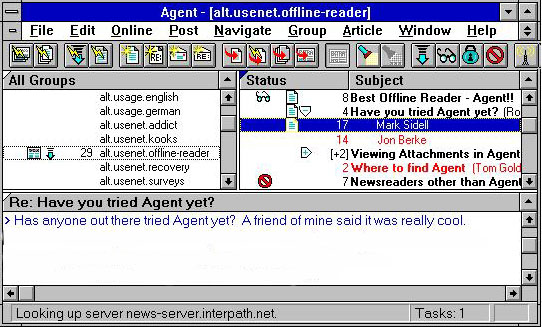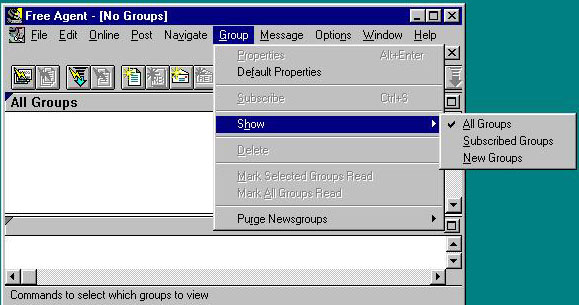Usenet
Usenet Groups Activity
Part One
You will recall that Usenet groups function like bulletin boards, where people post their messages and respond to others. You access the postings via a newsreader, which keeps track of the groups you follow and, within those groups, of the threads and messages you have read. The first step is to determine if your service provider gives you the Usenet option. To ascertain this, you must check with your service provider or your systems manager.If you do not have access to newsgroups, go back to Objective #2 and pick your next activity. You will not be able to continue with this Usenet exercise. Perhaps your FL methods instructor will allow you to do something else in lieu of the Usenet activity--like providing brownies for the class discussion about using newsgroups and Usenet!
If you do have Usenet access, good for you! Please continue with the activity.
The next step is to get a newsreader. If you are using Netscape, you can use its built-in newsreader. It operates using pull-down menus, and a typical screen looks like this:
Some newsreaders exist as freeware. One such application is Free Agent, a newsreaders for Windows and the pc platform. Please note that this is just one of the possibilities for newsreaders. You can find more by doing an Internet search on AltaVista, for example, using the keyword "newsreader."
The screen you get when using Free Agent looks like this:

Once again, operation is facilitated by the use of pull-down menus, illustrated below.

You can download Free Agent
here.
If you are operating under the Mac platform, try one of the following newsreaders, both of which are freeware:
NewsWatcher (This is a public site with a top capacity of 20 at any one time, so if it is busy, either try again later or use the next site below.)
If you have trouble connecting to these sites, you can always perform a Web search for the name of the newsreader you're looking for and find another download site.
Part Two
Once you have your newsreader installed, spend some time looking around for some newsgroups you might want to "join" or participate in by posting messages. Newsgroups are organized hierarchically, into categories and subcategories. Ideally, this is meant to help you find the newsgroup you want, but it's not always clear where to look. In the official Usenet hierarchies, there are seven main categories, which appear as prefixes. You can usually tell the general category of the newsgroup by its prefix:| Newsgroup Hierarchy | Meaning |
| comp | Computers |
| misc | Miscellaneous
(could be anything) |
| news | News--Usenet News
The Usenet system itself |
| rec | Recreation
(music, sports, games) |
| soc | Social
(social groups, discussions of society) |
| sci | Science |
| talk | Talk (mostly debate) |
Categories are divided in newsgroup names by dots, UNIX-style. The newsgroup for discussing the cultural aspects of Latin American countries, for example, is called soc.culture.latin-america.
In reality, many more categories exist. A more
comprehensive listing of hierarchies can be found here.
If you follow the links indicated, you will end up with a listing of k12.lang
newsgroups that exist and are targeted specifically towards the support
of K-12 foreign language instruction as well as newsgroups on cultures
of many foreign countries. Descriptive information on these groups is also
available. You can then use your newly acquired newsgroup reader to search
for the groups that sound interesting to you.
Assignment
Find a newsgroup for language and one for culture and "hang out" on these newsgroups for a week. After a few days, you venture a posting, either in the target language if appropriate or dealing with a particular cultural topic or question. Print out the responses to your query and take them to your methods class for discussion.
Before jumping right in, it would
be wise to read a little more
about newsgroups in general and Usenet. A definite netiquette exists in
these groups, and you would not want to offend anyone or upset their applecart.
[Learning the basics]